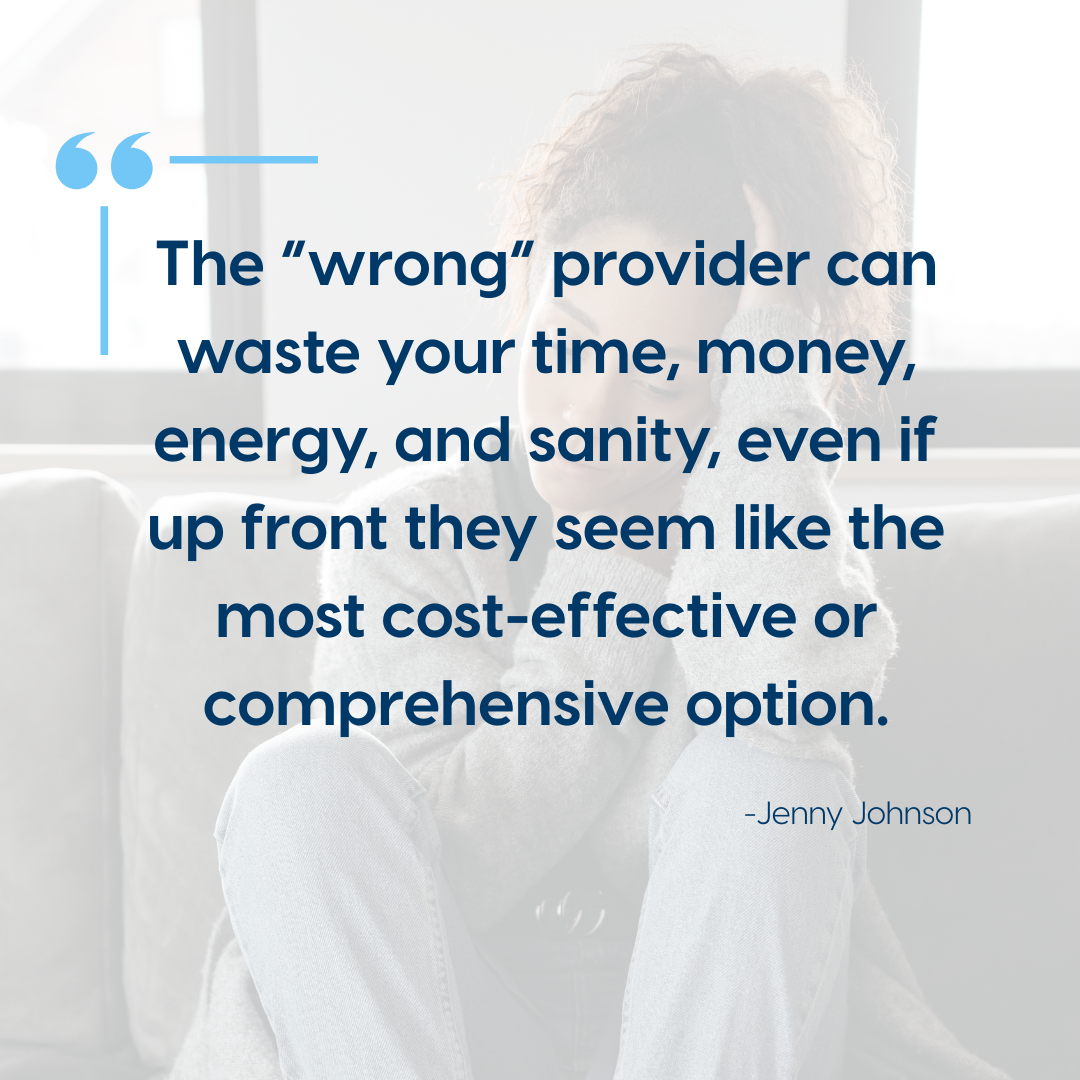If you or a loved one suspects that health symptoms are linked to an indoor environmental exposure—such as mold, mycotoxins, chemicals, or other air quality concerns—finding the right medical provider is crucial.
Unfortunately, not many medical providers are familiar with the complex nature of environmental illness. The “wrong” provider can waste your time, money, energy, and sanity, even if up front they seem like the most cost-effective or comprehensive option. So please read on for tips to snag the right provider for you.
When I first approached my PCP about my health concerns related to mold exposure, he assured me that stress and hormone imbalances were the likely culprits for the fatigue, insomnia, severe PMS, and suicidal ideation I was experiencing. While these imbalances were certainly part of the picture, my intuitive sense was that a deeper root cause was driving them—and I turned out to be right.
My kids were young at the time of our family’s experience with environmental illness, and I am forever grateful for the open-mindedness of their pediatrician. By the grace of God, she happened to be familiar with the term “Sick Building Syndrome” and immediately associated my son’s seemingly disconnected symptoms with something bigger: the air he was breathing.

I eventually found a doctor trained in functional medicine who was skilled at looking at the body as an interconnected whole rather than as isolated systems. Being familiar with the Shoemaker Protocol—the only evidence-based method for diagnosing and treating biotoxin Illness—he was able to take my family through the proven step-by-step process of putting our bodies back together after mold exposure.
Our doctor validated our concerns and treated us with sound medical practices that benefited us rather than his own bottom line. He billed insurance when possible, his approach was empowering rather than fear-based, his staff members were efficient and friendly, and he used a simple phone app to answer our questions between appointments.
Little did I know, I had stumbled upon a rare gem!
Many of us experience dozens of false starts with clinicians who are not as knowledgeable, honest, kind, or organized. You can learn more about my story and recovery in my interview with Change the Air Foundation here.
To help you advocate for yourself or your family, here are 17 thoughtful questions you can ask potential providers before committing to care. These questions will help clarify their experience, treatment philosophy, and whether they’re a good fit for your unique needs.
1. Do you treat patients with health issues related to indoor air quality concerns?
Start by confirming whether this is within the provider’s scope. Many doctors are unfamiliar with the wide-reaching effects of indoor environmental exposures.
2. What specific types of exposures do you have expertise in treating—and for how long?
Ask about their experience with specific exposures like water-damaged buildings (mold, biotoxins), VOCs, carbon monoxide, radon, asbestos, and lead.
3. What is your treatment philosophy or approach?
Understanding whether the provider practices conventional, integrative, or functional medicine—and whether they follow specific protocols (like the Shoemaker Protocol)—can help you align your care preferences.
4. Are you a member of professional organizations such as Surviving Mold or ISEAI?
Membership in organizations like Surviving Mold or the International Society for Environmentally Acquired Illness (ISEAI) indicates the provider is likely staying current with research and best practices in this evolving field.
5. What proportion of your patients achieve full recovery, and what is the typical timeline?
Recovery from environmental illness can be complex and nonlinear. This question helps set realistic expectations and shows how much outcome tracking the provider does.
6. Is anyone in your office able to prescribe medications? Can you work without pharmaceuticals if I prefer a natural route?
You may want both options available. Clarify whether they can prescribe and how open they are to tailoring treatment to your values.
7. Are you experienced in treating children? Could you treat our whole family?
If environmental exposure affects your household, it’s often helpful to have a single provider (or clinic) who can treat both adults and children.
8. Can all or some appointments take place via telehealth?
If you’re dealing with sensitivities or travel limitations, access to virtual appointments can be a game-changer.
9. Are you licensed to treat patients in my state?
Even for telehealth, many providers must be licensed in the state where the patient resides. Make sure they can legally provide care where you are.
10. What should I expect in terms of cost? Is any of your care covered by insurance, Medicaid, or Medicare?
Environmental medicine often falls outside the bounds of insurance coverage. Ask about all associated costs, and whether any labs, prescriptions, or services are billable.
11. When could I get started as a new patient?
Some providers have long waitlists. If you're seeking timely care, ask about the expected onboarding timeline.
12. Do you offer a membership model? What’s included, how does it work, and is there an early termination option?
Many integrative or functional clinics operate on a membership basis. Be clear on what you’re committing to—and whether you can opt out if it’s not a good fit.
13. How frequent and how long are most appointments?
Get a sense of the provider’s typical rhythm and how in-depth your visits will be.
14. What support is available between appointments?
Ask whether there’s a patient portal, email access, or a health coach—and if those services come with extra fees.
15. Can your office also help with related issues like digestive problems, MCAS, infections, autoimmunity, or cognitive challenges?
Environmental illness rarely exists in isolation. It’s helpful if the provider has experience with overlapping conditions like trauma, chronic infections, PANS/PANDAS, or hormone imbalances.
16. Can your office provide documentation for school, work, disability, or legal purposes?
You may need formal letters of medical necessity, accommodation forms, or support for disability claims.
17. Self-Assessment: How do I feel during and after the call or visit?
Beyond credentials and experience, it’s essential to listen to your gut. Did you feel heard, respected, and safe? Was the staff kind and responsive? Trust and rapport matter deeply on a healing journey.
Final Thoughts
Choosing a provider who understands environmental illness can be life-changing. These questions aren't just about gathering facts—they’re about finding someone who respects your experience and can walk with you on the road to recovery.
Save or print this list for your next provider interview. It could be your most powerful tool in finding care that truly supports your healing.
About the Author:

Jenny Johnson PT, FMCHC, NBC-HWC
CIRS Coach & Consultant
Shoemaker Proficiency Partner
Professional Member, Surviving Mold and ISEAI
Faculty Member, CIRSx Institute
Facilitator of the CIRS Healing Collective
Contact: [email protected]
